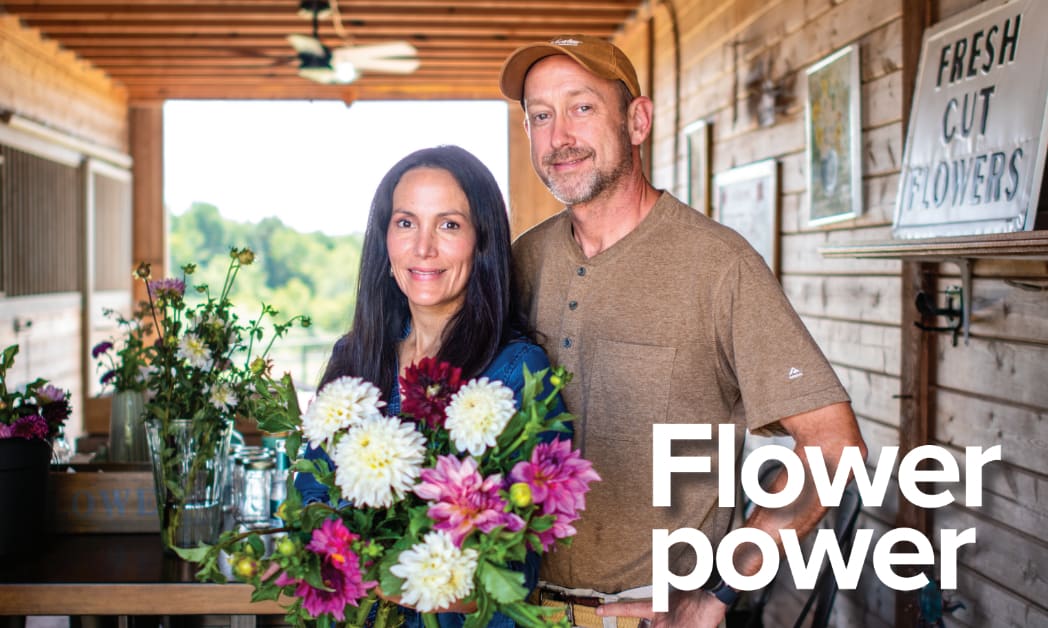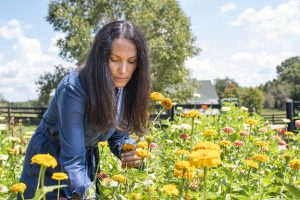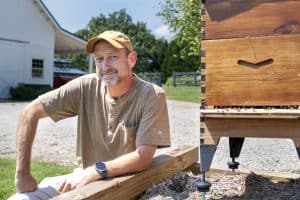
by Porter Gable
John Tupper never imagined he would describe himself as a beekeeper and flower farmer while in his corporate job in board rooms across North and South America. The deep roots he and his wife, Angelica, planted at their local farm during the pandemic changed their lives. Just 20 short months ago, the couple opened Five Blossoms Farm, a venture that has been a wise decision for them, both personally and professionally.
At that time, the York Electric Cooperative members and their four children wanted to start over. Tired from the stressful hand the pandemic dealt them at home and in their corporate jobs, and broken-hearted from the loss of their son, Drew, the Tuppers were searching for a way to restore life’s happiness. Angelica’s overflowing flowerbeds and John’s backyard beekeeping were hobbies that became a successful business when Five Blossoms Farm was born.
The seed
John and Angelica met in Bogota, Colombia, through their work as software engineers, in 2010. “I didn’t even have a houseplant in my apartment in Bogota,” Angelica says. “After marrying John, and moving to the United States, my mother-in-law, a master gardener, gave me tips on what to plant on our porch.”
Those planters multiplied through the years, spilling into flower beds that covered every sunlit part of their back- yard in Lake Wylie. After a long day at work, Angelica would go to her flowers to reset. She still finds this to be true, though now she has an acre of blooms to work with.
Angelica recalls admiring beautiful photos of a peony farm in North Carolina in a magazine. After a visit, she planted peonies from the farm at her Lake Wylie home. Years later she remembers thinking, “We could do this, too.”
“I had this crazy idea to turn our hobbies into a business, move to the country and give it a go. I asked John what he thought, and he said ‘yes.’”
The Tuppers capitalized on their passions, investing their time and energy into something more fulfilling than their day jobs by turning to the land where they’ve “had unexpected success,” according to John.

Deep roots
John and Angelica are proud to come from humble beginnings, not taking their family and cultural histories for granted. Instead, they look at this opportunity as a blessing afforded to them because of their families and experiences.
When they decided to make this change, the whole family pitched in to offer support. John’s sister designed the farm’s logo, a tribute to their five children. Their two boys are represented by blue hydrangeas, twin girls, represented by the pink peonies and their late son, Drew, the angel in the center shown as a white orchid. It’s no surprise to them that the elements of life Drew loved most are at the center of their farm’s success: nature, creativity, and photography. Redefining their purpose and cultivating collaboration between their family and the community has been life-changing.
“Even the folks who know us see us differently,” says John. “We even have a deeper connection to family in New Zealand because they are also in the flower business, selling flowers commercially.”
His grandmother loved barns similar to the one they own and painted them often, along with other still-life images of flowers, much like those grown in the field. John’s dad surprised him with a door mat with “Tupper’s Barn” written in the center that his grandmother had made years ago. Now, it is front and center as folks enter their barn for events featuring John’s bees or Angelica’s flowers.
Angelica’s mother and brother recently visited from Colombia, gladly helping on the farm, cutting flowers for bouquet orders, planting new flowers, greeting customers, and enjoying the gifts of nature.
“My grandfather, a farmer, was pushed out from his land because of war, and John’s grandfather was pushed into war [World War II]” Angelica says. She and John appreciate their respective histories and cultural differences but continue to grow together as business owners and as a couple. She surprises folks with this business.
“In my culture, it is customary to get away from the land to be successful by studying to be a professional. I followed this trend, now an engineer by trade. However, I have found that I’m a flower farmer at heart. I’ve proved you can do both,” she says.
The Tuppers moved to the farm on Crossland Road in Clover in February 2021 and by July of the same year, sold their first flower.
“We literally moved with planters full of peonies that were set to bloom in April and trays with seedlings ready to be planted,” John says. “Angelica learned all she could about soil, planting rotations, growing the best crops, marketing on social media, and collaborating with other local growers and creatives, while I oversaw larger projects, like the construction of our new greenhouse, and business transactions. Our kids even join in the fun and get their hands dirty.”
Isabella, the quiet one, says she “loves [her dad’s] honey the most.” You can often find her walking among the flowers and making her own bouquets. Her sister, Natalie, loves talking to their frequent guests and having the open land to run. “I love the trees and the space we have for our dog, Milo,” she says.

Rich soil for generations
Whether they first learned about the farm through their CSA subscription program or one of the Tupper’s workshops, the farm sees repeat customers who bring friends and help spread the word.
“Support and encouragement come from everywhere,” John says, adding that they appreciate the outreach of their neighbors and community members.
Additionally, the creative community they have joined has provided friendships, partnerships, and exciting collaborations.
“From photo shoots and flower arranging classes, to natural dyeing with flowers and the byproducts of beekeeping, we continue to find new ways to serve and connect the community,” Angelica says. Their work has offered them peace and healing, but they have also offered the same sanctuary for their customers.
Since 2021, Five Blossoms Farm, which is served by York Electric Cooperative, has tripled its sales. Now, they are focused on what is next, and excited for what the future holds.
“We are investing in the business and even ordered a new electric truck that will be here in a few weeks,” says John.
“Our hope is that we create something here that lasts for our kids,” says Angelica. “A legacy rooted in good soil.”
Connect with Five Blossom Farms – Follow Angelica and John Tupper on their journey
- Website
- Instagram
- Facebook
- Visit York County website
- Sign up for a Community Supported Agriculture (CSA) subscription and pick up a weekly order of fresh flowers right from the farm.
- Join in one of the many creative collaboration workshops in the barn.
